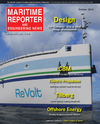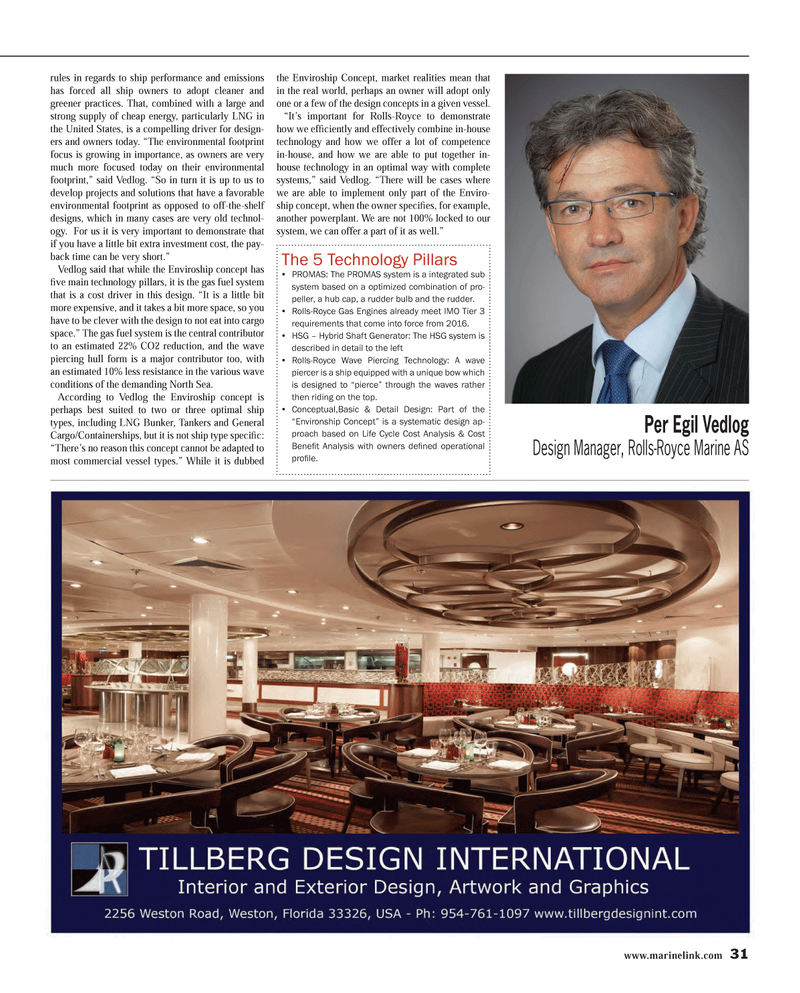
Page 31: of Maritime Reporter Magazine (October 2014)
Marine Design Edition
Read this page in Pdf, Flash or Html5 edition of October 2014 Maritime Reporter Magazine
www.marinelink.com 31 rules in regards to ship performance and emissions has forced all ship owners to adopt cleaner and greener practices. That, combined with a large and strong supply of cheap energy, particularly LNG in the United States, is a compelling driver for design- ers and owners today. “The environmental footprint focus is growing in importance, as owners are very much more focused today on their environmental footprint,” said Vedlog. “So in turn it is up to us to develop projects and solutions that have a favorable environmental footprint as opposed to off-the-shelf designs, which in many cases are very old technol- ogy. For us it is very important to demonstrate that if you have a little bit extra investment cost, the pay- back time can be very short.”
Vedlog said that while the Enviroship concept has fi ve main technology pillars, it is the gas fuel system that is a cost driver in this design. “It is a little bit more expensive, and it takes a bit more space, so you have to be clever with the design to not eat into cargo space.” The gas fuel system is the central contributor to an estimated 22% CO2 reduction, and the wave piercing hull form is a major contributor too, with an estimated 10% less resistance in the various wave conditions of the demanding North Sea.
According to Vedlog the Enviroship concept is perhaps best suited to two or three optimal ship types, including LNG Bunker, Tankers and General
Cargo/Containerships, but it is not ship type specifi c: “There’s no reason this concept cannot be adapted to most commercial vessel types.” While it is dubbed the Enviroship Concept, market realities mean that in the real world, perhaps an owner will adopt only one or a few of the design concepts in a given vessel. “It’s important for Rolls-Royce to demonstrate how we effi ciently and effectively combine in-house technology and how we offer a lot of competence in-house, and how we are able to put together in- house technology in an optimal way with complete systems,” said Vedlog. “There will be cases where we are able to implement only part of the Enviro- ship concept, when the owner specifi es, for example, another powerplant. We are not 100% locked to our system, we can offer a part of it as well.”
The 5 Technology Pillars • PROMAS: The PROMAS system is a integrated sub system based on a optimized combination of pro- peller, a hub cap, a rudder bulb and the rudder. • Rolls-Royce Gas Engines already meet IMO Tier 3 requirements that come into force from 2016. • HSG – Hybrid Shaft Generator: The HSG system is described in detail to the left • Rolls-Royce Wave Piercing Technology: A wave piercer is a ship equipped with a unique bow which is designed to “pierce” through the waves rather then riding on the top. • Conceptual,Basic & Detail Design: Part of the “Environship Concept” is a systematic design ap- proach based on Life Cycle Cost Analysis & Cost
Benefi t Analysis with owners defi ned operational profi le.
Per Egil Vedlog
Design Manager, Rolls-Royce Marine AS
MR #10 (26-33).indd 31 10/1/2014 9:41:29 AM

 30
30

 32
32
